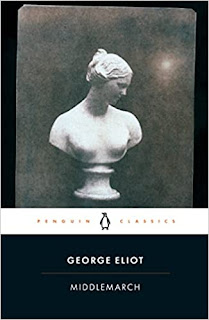“We are all humiliated by the sudden discovery of a fact which has existed very comfortably and perhaps been staring at us in private while we have been making up our own world entirely without it.” George Eliot’s Middlemarch is filled with wonderful aphorisms. Reading it is like being in analysis. In fact, the above locution could be a definition of psychoanalysis one of whose aims is to make the unconscious conscious. Of course, Middlemarch is a novel which requires a good amount of agency on the part of the reader and revelation, if and when it occurs, may hit one like a ton of bricks. Many patients in analysis are caught unawares with the very process of what they're supposed to be going through passing them by, since they're likely dozing off on the couch. How cozy to be dreaming and having the doctor, with whom you're having the father or mother transference, there to comfort you when you awaken. The New Yorker’s Rebecca Mead wrote My Life in Middlemarch and the novel is nothing if not a Baedeker of emotion itself. Here is Eliot on the intellectual Casaubon, the author of Key to All Mythologies, a book that, as has been pointed out, bears some resemblance to Sir James Frazer’s The Golden Bough. “For my part, I am very sorry for him. It is an uneasy lot at best to be what we call highly taught and not to enjoy: to be present at this great spectacle of life and never to be liberated from a small, hungry, shivering self—never to be fully possessed by the glory we behold, never to have our consciousness rapturously transformed into the vividness of a thought, the ardor of a passion, the energy of an action, but always to be scholarly and uninspired, ambitious and timid, scrupulous and dimsighted.”
Read "The Real Thing" by Francis Levy, HuffPost
and listen to "Think" by Aretha Franklin





No comments:
Post a Comment
Note: Only a member of this blog may post a comment.